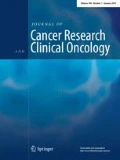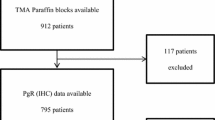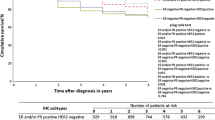Abstract
Purpose
The role of progesterone (PR) expression in the management of breast cancer is controversial. The aim of this study is to evaluate the characteristics and prognosis of progesterone status among breast cancers patients in a population-based analysis.
Materials and methods
Through the Tuscan Cancer Registry data on all the invasive breast cancer cases diagnosed during the period 2004–2005 in the provinces of Florence and Prato, central Italy, were retrieved. Histological reports were re-examined to obtain information on the percentage of positive tumor cells for estrogen (ER), progesterone (PR) receptors, Ki67 marker and human epidermal growth factor 2 (HER2). Information on age, stage, differentiation grade were also obtained.
Results
Out of 1487 patients, 28% had PR− breast cancer. These patients were older (p 0.006) than PR+ cancer patients, with more frequently high Ki67 (p < 0.0001), HER2 + (p < 0.0001), ER− (p < 0.0001) tumoral expression. The ER+/PR+ subtype was the most represented (n.1053), while ER−/PR+ was the most rare (n.23); 210 cases (14.1%) ER+ PR− and 201 (13.5%) ER−/PR− cases were found. Analysis of survival by the Cox proportional hazards model showed an independent prognostic value of PR expression (p < 0.0001), also when estrogen, Ki67, HER2 status and age were included. The 5-year cancer-specific survival was 82.1, 86.5, 100, 92% for ER−/PR−, ER+/PR−, ER−/PR+, ER+/PR+ subtype, respectively.
Conclusions
Our study revealed significant differences in clinicopathological characteristics among breast cancer according to PR expression and confirmed its prognostic independent role, suggesting a role of PR in the improvement of breast cancer prognostic characterization.

Similar content being viewed by others
References
Bae SY, Kim S, Lee JH, Lee H, Kil WH, Kim SW, Lee JE, Nam SJ (2015) Poor prognosis of single hormone receptor-positive breast cancer: similar outcome as triple negative breast cancer. BMC Cancer 15:138
Bogina G, Lunardi G, Coati F, Zamboni G, Gori S, Bortesi L, Marconi M, Cassabndrini PA, Turazza M, Cortesi L, DeMatteis E, Ficarra G, Ibrahim T, Serra P, Medri L, Giraudi S, Lambertini M, Carli F, Foglietta J, Sidoni A, Nunzi M, Ficorella C, Diadema MR, Del Mastro L (2015) Progesterone receptor status and clinical outcome in breast cancer patients with estrogen receptor-positive locoregional recurrence. Tumori 101(4):398–403
Caldarella A, Crocetti E, Bianchi S, Vezzosi V, Urso C, Biancalani M, Zappa M (2011) Female breast cancer status according to ER, PR and HER2 expression: a population based analysis. Pathol Oncol Res 17:753–758
Cserni G, Francz M, Kálmán E, Kelemen G, Komjáthy DC, Kovács I, Kulka J, Sarkadi L, Udvarhelyi N, Vass L, Vörös A (2011) Estrogen receptor negative and progesterone receptor positive breast carcinomas—How frequent are they? Pathol Oncol Res 17:663–668
De Maeyer L, Van Limbergen EV, De Nys K (2007) Does estrogen receptor-negative/progesterone receptor-positive breast carcinoma exist? JCO. doi:10.1200/JCO.2007.14.8411
Goldhirsch A, Wood WC, Coates AS (2011) Strategies for subtypes—dealing with the diversity of breast cancer: highlights of the St. Gallen International Expert Consensus on the Primary Therapy of Early Breast Cancer 2011. Ann Oncol 22:1736–1747 (The St. Gallen International Expert Consensus 2011)
Hefti MM, Hu R, Knoblauhc NW, Collins LC, Haibe-Kains B, Tamimi RM, Beck AH (2013) Estrogen receptor negative/progesterone receptor positive breast cancer is not a reproducible subtype. Breast Cancer Res 15:R68
Itoh M, Iwamoto T, Matsuoka J, Nogami T, Motoki T, Shien T, Taira N, Niikura N, Hayashi N, Ohtani S, Higaki K, Fujiwara T, Doihara H, Symmans WF, Pusztai L (2014) Estrogen receptor (ER) mRNA expression and molecular subtype distribution in ER-negative/progesterone receptor-positive breast cancers. Breast Cancer Res Treat 143:403–409
Kos Z, Dabbs DJ (2016) Biomarker assessment and molecular testing for prognostication in breast cancer. Histopathology 68:70–85
Liu S, Chia SK, Mehl E, Leung S, Rajput A, Chemag MCU, Nielsen TO (2010) Progesterone receptor is a significant factor associated with clinical outcomes and effect of adjuvant tamoxifen therapy in breast cancer patients. Breast Cancer Res Treat 119:53–61
Nishimukai A, Yagi A, Miyagawa Y, Enomoto Y, Mrase K, Imamura M, Takatsuka Y, Sakita I, Hatada T, Miyoshi Y (2015) High Ki67 expression and low progesterone receptor expression could independently lead to a worse prognosis fro postmenopausal patients with estrogen receptor-positive and HER2-negative breast cancer. Clin Breast Cancer 15(3):204–211
Park S, Park BW, Kim TH, Jeon CW, Kang HS, Choi JE, Hwang KT, Kim IC (2013) Lack of either estrogen or progesterone expression is associated with poor survival outcome among luminal A breast cancer subtype. Ann Surg Oncol 20(5):1505–1513
Prat A, Cheang MCU, Parker JS, Carrasco E, Caballero R, Tyldesley S, Gelmon K, Bernard PS, Nielsen TO, Perou CM (2013) Prognostic significance of progesterone receptor-positive tumor cells within immunohistochemically defined luminal a breast cancer. JCO 31:203–209
Purdie CA, Quinlan P, Jordan LB, Ashfield A, Dewar JA, Thompson AM (2014) Progesterone receptor expression is an independent prognostic variable in early breast cancer: a population based study. BJC 110:565–572
Rakha EA, El-Sayed ME, Green AR, Paish EC, Powe GD, Gee J, Nicholson RJ, Lee HSA, Robertson JFR, Ellis IO (2007) Biologic and clinical characteristics of breast cancer with single hormone receptor-positive phenotype. J Clin Oncol 25:4772–4778
Schroth W, Winter S, Buttner F, Goletz S, Faist S, Brinkmann F, Saldores P, Heidemann E, Ott G, Gerteis A, Alscher MD, Dippon J, Schwab M, Brauch H, Fritz P (2016) Clinical outcome and global gene expression data support the existence of the estrogen receptor-negative/progesterone receptor-positive invasive breast cancer phenotype. Breast Cancer Res Treat 155(1):85–97
Shen T, Brandwein-Gensler M, Hameed O, Siegal GP, Wei S (2015) Characterization of estrogen receptor-negative/progesterone receptor-positive breast cancer. Human Pathol 46:1776–1784
Sun JY, Wu SG, Li FY, Lin HX, He ZY (2016) Progesterone receptor loss identifies hormone receptor-positive and HER2-negative breast cancer subgroups at higher risk of relapse: a retrospective cohort study. OncoTargets Ther 9:1707–1713
Acknowledgements
The authors acknowledge the staff of Tuscan Cancer Registry, Institute for Study and Cancer.
Author information
Authors and Affiliations
Corresponding author
Ethics declarations
Conflict of interest
The authors declare that they have no conflict of interest.
Rights and permissions
About this article
Cite this article
Caldarella, A., Barchielli, A. Prognostic role of progesterone receptor expression in a population-based analysis. J Cancer Res Clin Oncol 143, 2505–2509 (2017). https://doi.org/10.1007/s00432-017-2514-3
Received:
Accepted:
Published:
Issue Date:
DOI: https://doi.org/10.1007/s00432-017-2514-3




